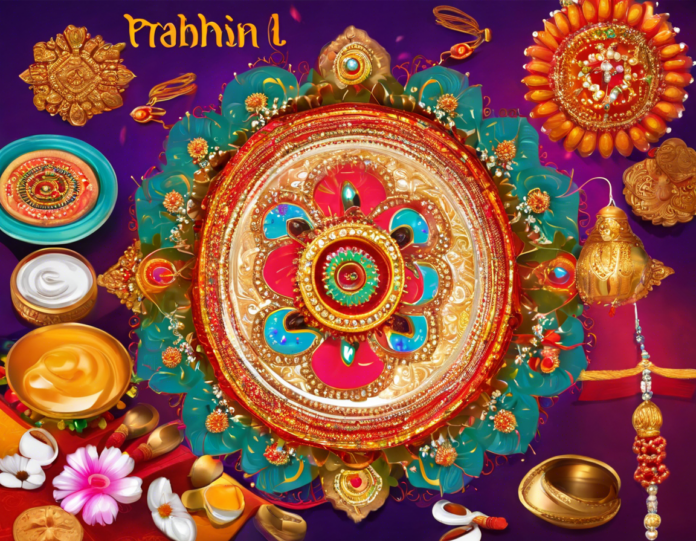Introduction
Raksha Bandhan, commonly known as Rakhi Purnima, is a significant Hindu festival that celebrates the eternal bond of love and protection between siblings. This auspicious occasion is observed across India and in various parts of the world where the Indian diaspora resides. The festival symbolizes the sacred connection between brothers and sisters, where sisters tie a sacred thread known as “Rakhi” on their brothers’ wrists, signifying their love, care, and prayers for their well-being. In return, brothers vow to protect their sisters and shower them with gifts and blessings. Let’s delve deeper into the significance, traditions, and celebrations of Rakhi Purnima to understand how this festival strengthens familial bonds and promotes love and unity among siblings.
The Significance of Raksha Bandhan
Raksha Bandhan holds a profound significance in Indian culture and traditions. The term “Raksha Bandhan” itself reflects the essence of the festival, with “Raksha” meaning “protection” and “Bandhan” symbolizing the “bond.” The festival is deeply rooted in mythology and folklore, with various legends portraying the significance of this auspicious day.
One of the most popular tales associated with Raksha Bandhan is the story of Lord Krishna and Draupadi. It is believed that when Draupadi tore a piece of her sari to bandage Krishna’s wounded finger, touched by her selfless gesture, the Lord vowed to protect her in times of distress. This tale epitomizes the essence of Raksha Bandhan, where the bond between a brother and sister transcends blood relations and embodies unconditional love and protection.
Traditions and Customs
The celebrations of Raksha Bandhan are characterized by joyous rituals and customs that add fervor to the festive spirit. The day typically begins with sisters preparing for the occasion by selecting a beautiful Rakhi, often embellished with beads, motifs, and charms, symbolizing their prayers for their brother’s well-being. The thread of the Rakhi is not merely a decorative item but a symbol of love that strengthens the bond between siblings.
On the day of Raksha Bandhan, sisters tie the Rakhi on their brothers’ wrists after performing a traditional aarti. This act symbolizes the sister’s love, respect, and prayers for her brother’s prosperity and long life. In return, brothers pledge to protect their sisters and offer them gifts as a token of love and appreciation. The exchange of gifts, sweets, and heartfelt wishes further enriches the festive celebrations, fostering love and camaraderie among family members.
Celebrations Across India
Raksha Bandhan is celebrated with great zeal and enthusiasm across India, transcending regional and cultural boundaries. In North India, the festival is marked by vibrant markets adorned with colorful Rakhis of all shapes and sizes. Sisters visit their brothers’ homes or gather at a common place to tie the Rakhi, exchange gifts, and savor delectable sweets.
In South India, Raksha Bandhan is known as Avani Avittam or Upakarma and is observed by changing the sacred thread (Yajnopavita) worn by Brahmins. The occasion is marked by rituals, prayers, and the renewal of spiritual vows, symbolizing the bond between the disciple and the guru.
In Western India, particularly in the state of Maharashtra, Raksha Bandhan coincides with the festival of Narali Purnima, where fishermen offer coconuts to the sea as a token of gratitude and seek blessings for a bountiful catch.
FAQs:
1. What is the significance of Raksha Bandhan?
– Raksha Bandhan symbolizes the bond of love and protection between siblings, where sisters tie Rakhis on their brothers’ wrists, signifying prayers for their well-being.
2. How is Raksha Bandhan celebrated in different regions of India?
– Raksha Bandhan is celebrated with varied customs and traditions across India, with each region adding its unique flair to the festive celebrations.
3. Can Rakhi be tied to someone other than a brother?
– Yes, Rakhi can be tied to cousins, close friends, or even colleagues to symbolize love, friendship, and mutual respect.
4. What is the significance of the gifts exchanged on Raksha Bandhan?
– The exchange of gifts on Raksha Bandhan symbolizes love, appreciation, and the bond shared between siblings.
5. Is Raksha Bandhan only celebrated by Hindus?
– While Raksha Bandhan is primarily a Hindu festival, people of various faiths and communities participate in the celebrations, highlighting the essence of unity and diversity.
Conclusion
Raksha Bandhan, with its rich traditions and heartfelt customs, serves as a poignant reminder of the enduring bond between siblings. The festival not only reinforces familial ties but also celebrates the values of love, protection, and unity. As we commemorate Rakhi Purnima in 2023, let us cherish the precious relationships in our lives and reaffirm our commitment to stand by our loved ones through thick and thin. May the spirit of Raksha Bandhan inspire us to nurture and empower our bonds, spreading love and harmony in our homes and hearts.












